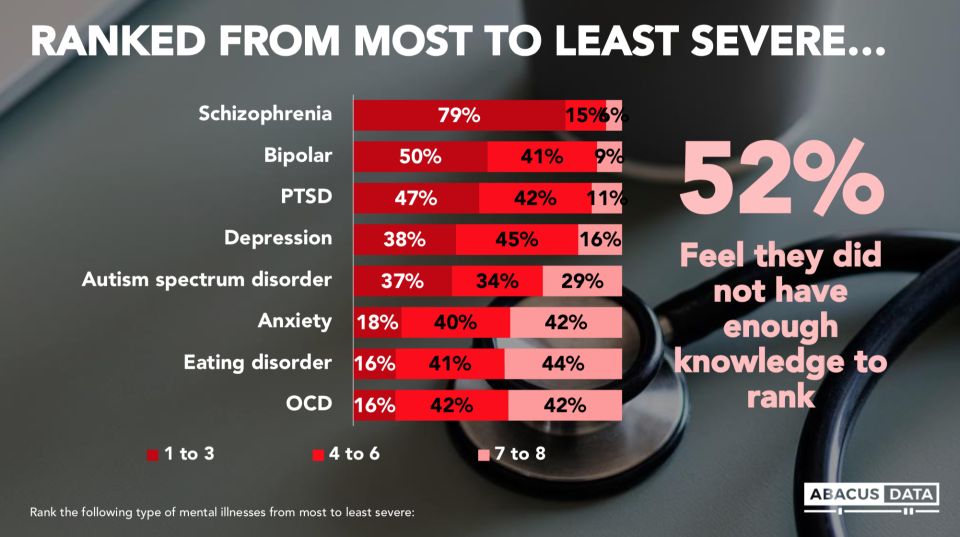Does no one care about anxiety? New survey results are bleak - but there's a catch

Cameron Algie may have started Play With Fire Improv and now lives life on the stage, but he says he suffered with anxiety for much of his life.
It grew over time. At first, it was difficult to go to Sunday School when he was kid. He entered adulthood socially disconnected and isolated. Algie began drinking to numb the pain and also started spiraling towards depression.
It was in his mid-20s that he began to hit was he calls his “emotional rock bottom.” Unable to leave the house and in a constant sense of feeling impending doom, he went to bed exhausted and unable to sleep.
ALSO SEE: How anxiety manifests itself across Canada

“Then obviously at some point you start to question whether you want to re-up again tomorrow. If every day is constantly pain and suffering, do I want to do this again?” he says. “I wanted to change that. I wanted to fix me. I wanted to fix the anxiety.”
A new survey by Yahoo Canada and Abacus shows that many Canadians have been in Algie’s shoes, with 41 per cent identifying themselves as someone struggling with anxiety and 30 per cent saying that they have been formally diagnosed with anxiety.

Despite those numbers, 42 per cent of people surveyed ranked anxiety as the least or second least severe mental illness.
“That one doesn’t surprise me necessarily … it’s just too common,” Algie says of the result. “If you’re comparing which one is worse, schizophrenia or anxiety, it’s like, ‘Oh, I don’t know anyone who is schizophrenic, so that feels like an extreme.’“

However, Dr. Martin Antony, professor of psychology at Ryerson University and author of the Anti-Anxiety Workbook says anxiety is something we all experience and that it itself is not a disorder.
“Anxiety in and of itself is not severe. It can be. It can range from ‘I feel a little bit nervous about a party I’m going to’ to ‘I can’t be around people at all and I can’t work,’” he explains. “For me, anxiety is like overeating. It’s a thing that everybody does.”
Antony also says anxiety, an emotion, is different from anxiety disorders, a broad category that includes a range of disorders that vary in severity, like generalized anxiety disorder, panic disorder, agoraphobia and more.
ALSO SEE: How does religion impact anxiety?
He adds that anxiety-related disorders, which include anxiety disorders, obsessive-compulsive disorder and post-traumatic stress disorder, affect about 20 per cent of the population.
Despite how common anxiety and anxiety disorders are, Christine Moberg, head of psychology for mental health app Pacifica, notes that it’s difficult to determine where the cut off point is between something like stress and clinical anxiety.
“There is no switch that all of a sudden you flipped it and now it’s something that is concerning,” she says. “I think what it comes down to is you’re functioning and how you’re feeling about yourself and your ability to get done what you’d like to get done and are you happy with the way that your life is going?”
For Algie, his anxiety took a toll on the quality of his life. He says he was constantly in flight or flight mode and was throwing up several times a day. When he finally started seeing a therapist, he learned he might have generalized anxiety disorder.
He spent around a year or less in therapy, but Algie says it was therapy, reading self-help books and things like the Sedona Method that brought him to the point where he felt like he could walk down the street.
Instead of focusing on trying to fix himself further, he decided he was going to place his attention on things that he enjoyed. One of those things was improv, where he says he was finally able to laugh again and didn’t have to consciously think about his anxiety.
“It’s very like be present and in the moment,” he says. “I’d come home from improv class and read The Power of Now, and I’m like, ‘Whoa, these are very similar.’”
His love of improv grew and from there and he became an instructor and founder of the Improv for Anxiety program at Second City Toronto. His Play with Fire Improv, a place for those who suffer from anxiety to use theatre as a way to be perfectly imperfect and live in the moment, was also born.
“I remember pitching to the artistic director and saying, ‘Hey, I want the people who are scared to take this class, to take this class,’ Algie recalls. “I remember him laughing and going, ‘That doesn’t make any logical business sense, but we’ll see what we can do.’”
ALSO SEE: Is anxiety curable? Why that’s the wrong question to ask
Now, he strives through the program to bring play back into people’s lives and help tame anxiety.
“Don’t under estimate the value of just laughing and having fun every once in a while instead of constantly trying to fix a broken brain,” he says. “It was so life changing just to be silly, and so I’m trying to hopefully smoothly transition people into that.”
During the month of October, Yahoo Canada is delving into anxiety and why it’s so prevalent among Canadians. Read more content from our multi-part series here.
Let us know what you think by commenting below and tweeting @YahooStyleCA and follow us on Twitter and Instagram.
Abacus Data, a market research firm based in Ottawa, conducted a survey for Yahoo Canada to test public attitudes towards anxiety as a medical condition, including social stigmas and cultural impacts. The study was an online survey of 1,500 Canadians residents, age 18 and over, who responded between Aug. 21 to Sept. 2, 2019. A random sample of panelists were invited to complete the survey from a set of partner panels based on the Lucid exchange platform. The margin of error for a comparable probability-based random sample of the same size is +/- 2.53%, 19 times out of 20. The data was weighted according to census data to ensure the sample matched Canada’s population according to age, gender, educational attainment, and region.



